Hard-Boiled Confectionery Market Research, 2031
The global hard-boiled confectionery market size was valued at $15.6 billion in 2021, and is projected to reach $21.3 billion by 2031, growing at a CAGR of 3.2% from 2022 to 2031.
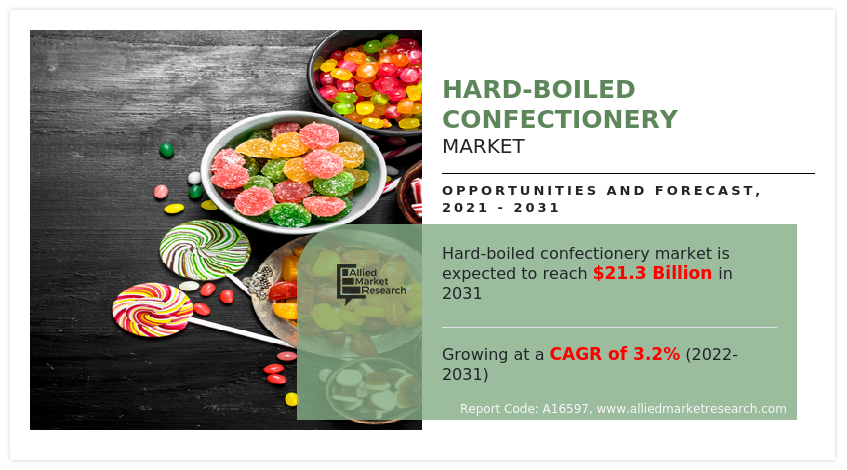
The hard-boiled confectionery market is segmented into Type, Flavor, Age Group and Distribution Channel.
Hard-boiled confectionery refers to the sweet or candy made by boiling or heating sugar-based syrups at a temperature of around 160 °C. Hard-boiled confectionery is also known as hard candy, boiled sweet, and sugar candy.
Economic growth, rise in disposable income, and rise in affordability are several important factors that are driving the hard-boiled confectionery market growth globally. In the past few years, trend of nuclear families has surged significantly and growth in the number of working couples is contributing actively in the increasing income of the families. This is further fueling the affordability of various confectionery items and premium products, which is exponentially propelling the growth of the global hard-boiled confectionery market.
Moreover, the growing trend of gifting confectionery items is a major factor that has a significant contribution in the overall growth of the hard-boiled confectionery industry. The rise in the consumers’ preference toward gifting confectionery products during celebratory and festive occasions such as Halloween, Diwali, Eid, birthdays, and school functions, is significantly boosting the demand for the hard-boiled confectionery across the globe. The trend of gifting confectionery items is gaining a rapid traction in the developing economies, which is expected to offer a significant impetus to the growth of the market during the forecast period.
Furthermore, rising young population is anticipated to propel the demand for the hard-boiled confectioneries in the forthcoming years. The demographic shifts and changing consumer tastes & preferences is encouraging new product development and introduction of innovative flavors in the herd-boiled candies. The manufacturers are boosting their investments toward development of new flavors along with the adoption of innovative fillings to enhance the taste of the hard-boiled confectioneries is expected to boost the growth of the global hard-boiled confectionery market during the forecast period.
A notable increase in the prevalence of diabetes among the global population along with rise in health-consciousness among the consumers is expected to drive the demand for the low-calorie or sugar-free hard-boiled confectionery items in the future. According to the International Diabetes Federation (IDF), in 2021, around 537 million people aged 20 years to 79 years were suffering from diabetes, globally. This number is expected to reach 643 million by 2030 and to 783 million by 2045. Therefore, a significant rise in the prevalence of diabetes among the global population is expected to drive the low-calorie hard-boiled confectionery market demand during the forecast period. Moreover, rising health-consciousness among adults, growing consumer expenditure on wellness products, and rising awareness regarding the availability of sugar-free hard-boiled confectioneries are anticipated to provide impetus to the market.
Further, rising initiatives by the manufacturers to invest in sustainable development is expected to boost the sales of the confectionery products at premium prices. The majority of the eco-conscious consumers associate their physical well-being with environmental issues that significantly influences their purchases. The eco-conscious consumers tend to spend more and buy confectioneries at premium prices for sustainably produced products. In 2017, Mars, a confectionery giant, announced to invest $1 billion to help cut emission of greenhouse gases from its value chain by 67% by the year 2050. This type of sustainability-oriented investments by the confectionery manufacturers is expected to attract the eco-conscious consumers, especially in the developed regions such as North America and Europe.
However, fluctuations in the prices of raw materials and rise in prevalence of type 1 diabetes among children are the major factors that may hamper the market growth during the forecast period. Fluctuations in prices of sugar are the result of various factors such as low yields, political tensions, climate change, and draughts. The global sugar prices increased rapidly from around $12.0 per Lbs. (pound) in January 2019 to $18.9 per Lbs. in January 2022. Therefore, sugar prices increased due to less production and more demand, may reduce the profitability of the manufacturers to a great extent. Furthermore, according to the IDF, over 1.2 million children and adolescents (0 to 19 years of age) were living with type 1 diabetes across the globe, in 2021. Surging prevalence of diabetes among the young population may negatively impact the demand for the hard-boiled confectionery market in the future.
According to the hard-boiled confectionery market analysis, the hard-boiled confectionery market is segmented on the basis of type, flavor, age group, distribution channel, and region. On the basis of type, the market is categorized into suckers and lollipops, jawbreakers, candy canes, rock candy, drops and disks, and others. By flavor, it is segmented into cherry, watermelon, lemon, strawberry, orange, butterscotch, and others. Depending on the age group, the market is categorized into children, adult, and geriatric. By distribution channel, the market is divided into supermarkets and hypermarkets, convenience stores, specialty stores, e-commerce, and others. Region-wise, the market is analyzed across North America, Europe, Asia-Pacific, and LAMEA (Latin America, the Middle East, and Africa).
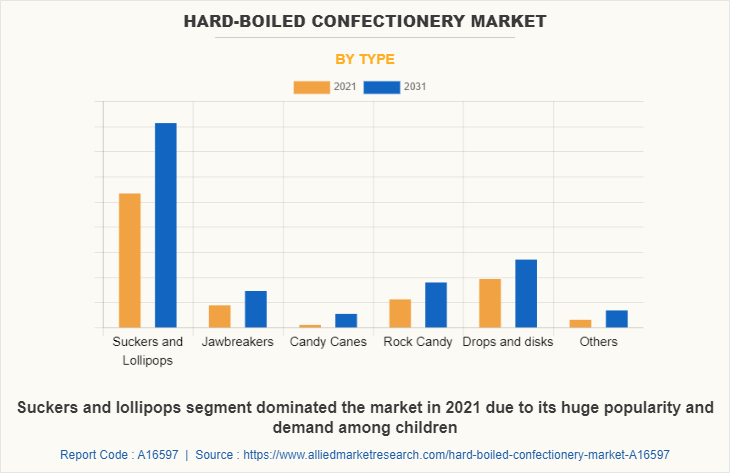
According to the hard-boiled confectionery market forecast, by type, the suckers and lollipops was the largest segment accounting for 40.6% of the hard-boiled confectionery market share in 2021 and is expected to sustain its significance during the forecast period. This massive growth of this segment is attributed to the huge demand and consumption of suckers and lollipops among children. The introduction of multiple flavors in lollipops and easy availability coupled with captivating marketing strategies adopted by the manufacturers to attract children has significantly boosted the growth of this segment. For instance, Foltin and Foltin (F&F) Ltd., a Hungary-based lollipop manufacturer has partnered with The Walt Disney Company to supply their lollipops to Disneyland Paris. The lollipops were packed with foil of different popular Disney characters to attract the children.
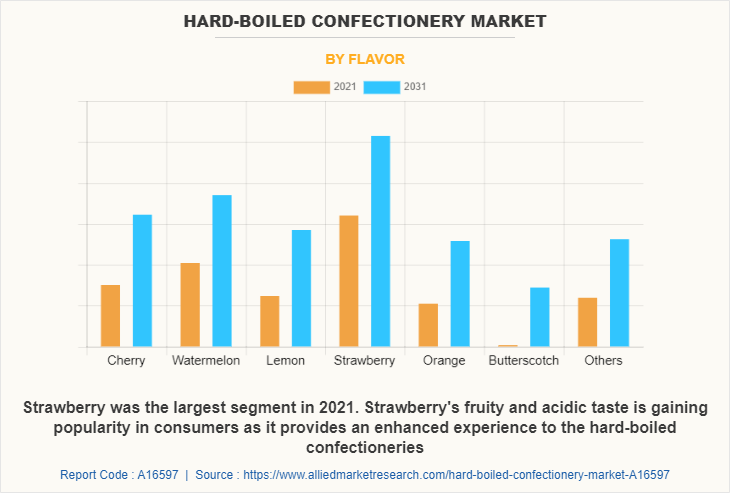
As per the hard-boiled confectionery market trends, by flavor, the strawberry was the dominant segment in 2021. This growth is attributed to the enhanced taste and nutritional benefits associated with the strawberries. The nutritional benefits of strawberry help in maintaining good cholesterol, lower blood pressure, and decrease the risks of cancer. Moreover, the fruity and acidic taste of strawberry enhances the experience of the hard-boiled confectionery consumers. Further, the manufacturers are experimenting to combine various flavors with strawberry to create a new combination that goes well with strawberry. The huge popularity of the strawberry flavored hard candies among the consumers is expected to sustain the dominance of the strawberry segment during the forecast period.
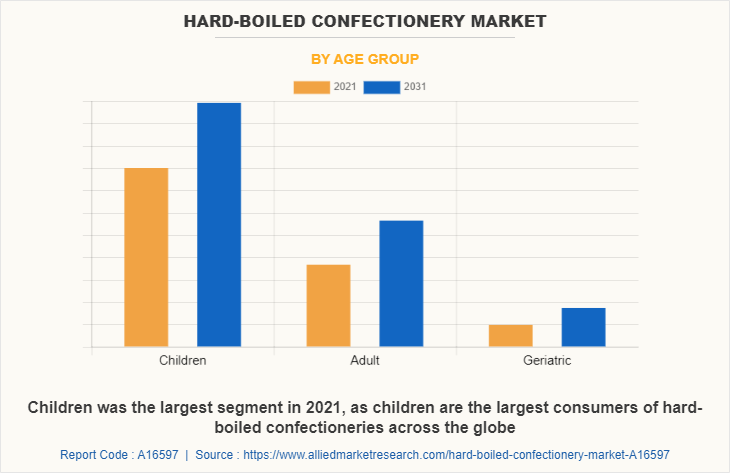
By age group, the children segment dominated the market in 2021. Children are the leading consumers of the hard-boiled confectioneries. According to the World Bank, in 2021, around 25% of the global population consisted of 14 years or below age group. With the improvement in the technologies and adoption of advanced tools in fertility clinics, the fertility rate of women is improving globally. Moreover, rising global population is expected to boost the demand for the hard-boiled confectionery in the future. The presence of huge number of young populations in developing and underdeveloped economies has led to the increased demand for the hard-boiled confectionery in the nations such as India, China, and Brazil.
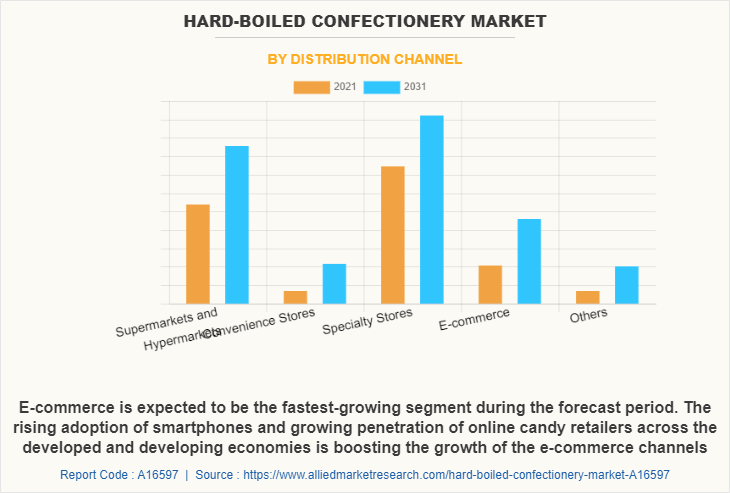
Depending on the distribution channel, e-commerce is anticipated to witness the highest CAGR during the forecast period. The e-commerce platform serves as a popular medium for the purchase of packaged food like hard-boiled confectionery. This is attributed to easy availability and the benefits such as information about the attributes of the products, time-saving features, and the facility of home delivery provided by the e-commerce platform. In addition, consumers prefer to buy products online since it is convenient and offers a large selection of brands that are not available in retail. Moreover, the e-commerce sales channel has increased the consumer reach owing to which it has evolved as a key source of revenue for many hard-boiled confectionery companies. Consumers are becoming more aware about the many purchase patterns that exist in society as technology advances and internet services become more widely available. The technology attracts the millennials and generation Z and is expected to influence the buying pattern of products. According to the United Nations Conference on Trade and Development (UNCTAD), the e-commerce sector's proportion of total retail sales increased from 16% to 19% in 2020. Furthermore, online sales are expected to grow notably shortly, due to the rapid increase in mobile users. An increase in e-commerce sales, improvements in logistics services, and ease in payment options further boost the growth of the global hard-boiled confectionery market.
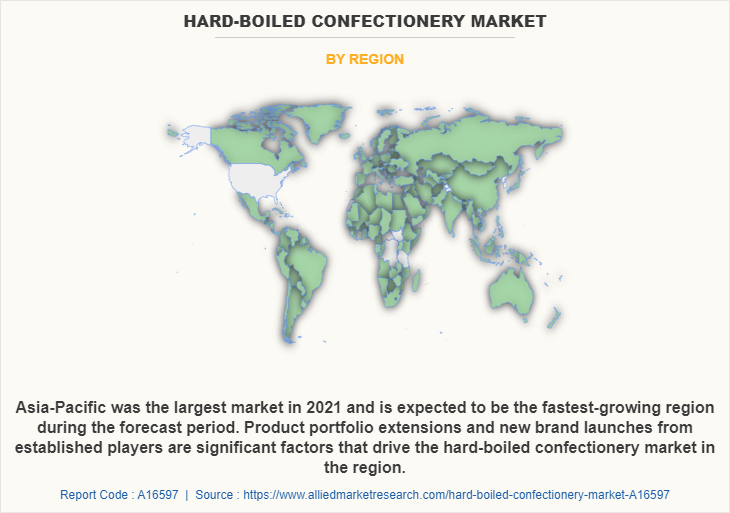
Region-wise, Asia-Pacific was the leading market in 2021 and is expected to be the fastest-growing market from 2022 to 2031. Asia-Pacific is home to over 60% of the global population with a majority of the population being young. The presence of a huge youth population, rise in employment, rise in disposable income, change in food habits of the consumers, and rise in number of product launches are the major factors that are expected to drive the growth of the Asia-Pacific hard-boiled confectionery market during the forecast period. Moreover, rising prevalence of diabetes coupled with growing geriatric population in the region are expected to boost the demand for the low-calorie hard-boiled confectionery products. According to the IDF, 3 in 4 individuals in low and middle-income nations were living with diabetes in 2021. Further, according to the United Nations, around 80% of the geriatric population is expected to live in low and middle-income countries by 2050. Therefore, the demand for sugar-free hard candies is expected to rise significantly in Asia-pacific during the forecast period.
Ferrero International S.A., Lotte Corporation, Mars, Incorporated, Mondelez International, Inc., Nestle S.A., Parle Products Pvt. Ltd., Perfetti Van Melle, The Hershey Company, Tootsie Roll Industries, and Valeo Foods Group are the major companies profiled in the hard-boiled confectionery market report. These manufacturers are constantly engaged in various developmental strategies such as partnerships, mergers, acquisitions, and new product launches to gain competitive edge and exploit the prevailing hard-boiled confectionery market opportunities.
Key Benefits For Stakeholders
- This report provides a quantitative analysis of the market segments, current trends, estimations, and dynamics of the hard-boiled confectionery market analysis from 2021 to 2031 to identify the prevailing hard-boiled confectionery market opportunities.
- The market research is offered along with information related to key drivers, restraints, and opportunities.
- Porter's five forces analysis highlights the potency of buyers and suppliers to enable stakeholders make profit-oriented business decisions and strengthen their supplier-buyer network.
- In-depth analysis of the hard-boiled confectionery market segmentation assists to determine the prevailing market opportunities.
- Major countries in each region are mapped according to their revenue contribution to the global market.
- Market player positioning facilitates benchmarking and provides a clear understanding of the present position of the market players.
- The report includes the analysis of the regional as well as global hard-boiled confectionery market trends, key players, market segments, application areas, and market growth strategies.
Hard-Boiled Confectionery Market Report Highlights
| Aspects | Details |
| Market Size By 2031 | USD 21.3 billion |
| Growth Rate | CAGR of 3.2% |
| Forecast period | 2021 - 2031 |
| Report Pages | 300 |
| By Type |
|
| By Flavor |
|
| By Age Group |
|
| By Distribution Channel |
|
| By Region |
|
| Key Market Players | Tootsie Roll Industries, Inc., Mondelez International Inc., valeo foods group, Nestlé S.A, Perfetti Van Melle, parle products pvt. ltd, FERRERO INTERNATIONAL S.A., Mars, Incorporated, Lotte Corporation, The Hershey Company |
Analyst Review
According to the CXO’s of leading companies, the confectionery industry is mature and countercyclical in nature as confectionery products are perceived as affordable luxuries. The industry is growing globally as multinational confectionery companies are offering sophisticated yet affordable products for middle-class consumers. Product innovation, strong marketing campaigns, and the retail market expansion drive the development of the hard-boiled confectionery market. Health awareness & consciousness among customers and diverse consumer eating habits & tastes further fuel the market growth. Consumer preferences in the sugar confectionary market are shifting toward soft mouthfeel in comparison to harder varieties. Manufacturers focus on the development of sugar-free and organic variants to boost the value sales and deliver products that support health and wellness.
Economic growth and rise in disposable income drive the growth of the hard-boiled confectionery market in emerging economies such as India and China. Increase in penetration of wide range of confectionery products in rural areas, diverse product range offered by established manufacturers, and rise in population are the major factors that drive the hard-boiled confectionery market in India. The rural market is presenting a lucrative growth opportunity to the manufacturers as majority of the population in developing nations lives in rural areas. The investments in infrastructure benefits the rural population by increasing their wages. The investments in rural areas in developing economies has increased drastically in the recent years, which is expected to provide impetus to the global hard-boiled confectionery market in the future.
The global hard-boiled confectionery market size was valued at $15.6 billion in 2021, and is projected to reach $21.3 billion by 2031
The global Hard-Boiled Confectionery market is projected to grow at a compound annual growth rate of 3.2% from 2022 to 2031 $21.3 billion by 2031
Ferrero International S.A., Lotte Corporation, Mars, Incorporated, Mondelez International, Inc., Nestle S.A., Parle Products Pvt. Ltd., Perfetti Van Melle, The Hershey Company, Tootsie Roll Industries, and Valeo Foods Group are the major companies profiled in the hard-boiled confectionery market report.
Region-wise, Asia-Pacific was the leading market in 2021
Economic growth, surge in the number of working couples, rise in disposable income, and rise in affordability drive the growth of the global hard-boiled confectionery market
Loading Table Of Content...



